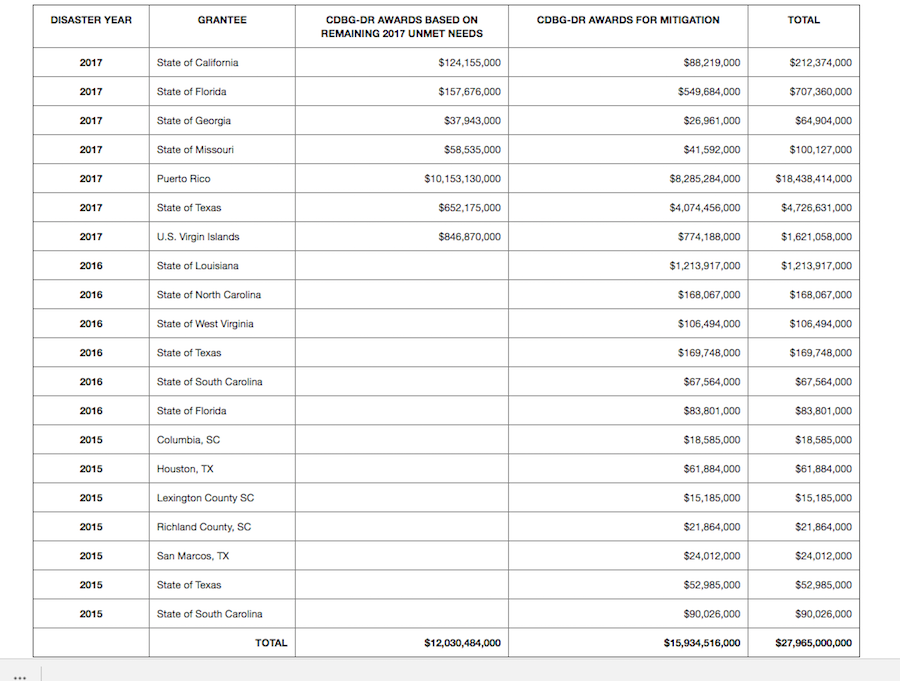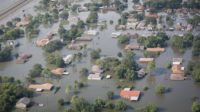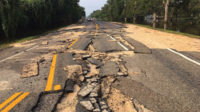The federal government has made $28 billion available to states that have suffered hurricanes and other natural disasters over the past three years, including a first-ever pool of $16 billion for mitigation efforts to prevent future losses from disasters.
The Housing and Urban Development Dept.’s Community Development Block Grant- Disaster Recovery program (CDBG-DR) awarded the bulk of the money to Puerto Rico, including $10.15 billion for unmet needs and $8.29 billion for mitigation.
“These funds are crucial to put forth our vision for the new, more resilient Puerto Rico that we want to construct, for our future generations,” said Gov. Ricard Roselló in a statement following HUD’s April 10 announcement.
Texas, hit hard last year by Hurricane Harvey, will receive $4.73 billion, including $4.07 billion for mitigation, while Florida, California, Missouri, and the U.S. Virgin Islands, which also suffered disasters in 2017, will also receive funds.
Other states, including North Carolina, South Carolina and Louisiana will receive a total of more than $2 billion for unmet needs for disasters dating back to 2015. The amounts for each state were based on data from the Federal Emergency Management Agency and the Small Business Administration.
The funding was included in the Bipartisan Budget Act of 2018, which was signed into law on Feb. 9. According to the National Oceanic and Atmospheric Administration, disasters in 2017 caused a record-breaking $306 billion in damage.
Money for unmet needs support disaster-recovery activities such as home rebuilding, business assistance, economic revitalization and infrastructure repair.
Funds for mitigation activities could include home buyouts, raising homes, moving communities and rebuilding a resilient electric grid.
Parameters for the mitigation awards, as well as awards for unmet needs, will be spelled out in two separate Federal Register notices that will be out “soon,” according to HUD spokesman Brian Sullivan. The notice for unmet needs, which will be based on previous such awards following disasters, will be released first.
Of the money for Puerto Rico, $2 billion has already been announced and set aside for making the island’s electric grid more resilient. Rosselló has said other priorities include the island’s water infrastructure, health, transportation, restoring and improving housing, transportation and schools.
Rosselló has said the territory needs $94.4 billion to recover from hurricanes Maria and Irma. Puerto Rico Rep. Jennifer González Colón, of the territory’s New Progressive Party, says Congress may allocate still more funds to Puerto Rico.
Steve Spears, president of the Association of General Contractors in Puerto Rico, says the announcement was encouraging news, especially with the previous slow pace of federal recovery dollars, partly because the territory is in receivership.
“Will it cover what needs to be covered? No, but it is a hell of a start,” he says. “The mitigation funds may or may not be enough depending on the final scope of what is considered mitigation.
Spears adds, “Once again, if a substantial portion is dedicated to the hardening or upgrading of the power grid to avoid future catastrophic failures that will help enormously.”
In Texas, which has already received about $5 billion in CBDG money, most of the new dollars will go toward mitigation, including elevating homes, buying out properties and hardening structures against wind and water, Texas Gov. Greg Abbott (R) said in a statement. The state also received more than $80 million for recovering from 2015 floods.
Mitigation funds have always been allowed under CBDG, but this is the first massive use of such funding, says Sullivan. After Superstorm Sandy, HUD awarded $2 billion for a national disaster resilience completion and a separate Rebuild by Design Competition.
Past CBDG-DR awards have taken years to trickle to the affected communities. But HUD spokeswoman Gloria Shanahan says that the process has been improved and that the new funds will move “the minute they are ready and the plan is approved.”





Post a comment to this article
Report Abusive Comment